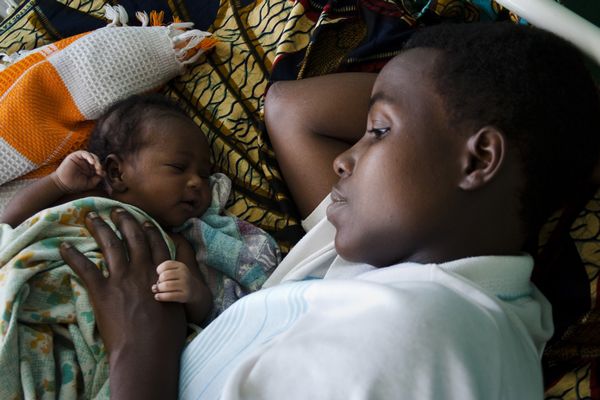MSF highlights medical approaches to avert maternal deaths during humanitarian crises
On International Women’s Day, the international medical humanitarian organisation, Medecins Sans Frontieres (MSF) is underlining the fact that far too many women continue to die avoidable deaths during childbirth. MSF’s briefing paper, “Maternal Death: The Avoidable Crisis” details how the provision of emergency obstetric care to pregnant women in acute and chronic humanitarian crises can have a direct impact and save women’s lives.
Following years expanding its own programs to meet the needs of pregnant women, MSF now seeks to draw attention to the dearth of emergency obstetric care in a number of crises. The paper examines the situation for pregnant women in 12 countries where MSF works, including Pakistan, Somalia, South Sudan and Haiti, and highlights the necessity of emergency medical assistance, particularly when complications occur.
“We know that fifteen percent of all pregnancies worldwide will face a life-threatening complication,” says Kara BLACKBURN, Women’s Health Advisor for MSF. “These women need access to quality emergency obstetric care whether they live in Sydney, Port-au-Prince or Mogadishu – the reality is the same whether in a modern hospital in an international city or in a conflict zone, refugee camp or under plastic sheeting after a devastating earthquake.”
Every day, approximately 1000 women die in childbirth or from a pregnancy-related complication. However, with the help of skilled birth attendants, and access to the appropriate drugs and equipment, women’s lives and those of their babies, can be saved.
Delivery is the most critical moment for saving women’s and babies’ lives, with most maternal deaths occurring just before, during, or just after delivery, often from complications that cannot be predicted. As an emergency medical organisation, MSF strives to have the most significant and immediate impact on reducing maternal death during humanitarian crises, and has invested significantly in developing the technical and logistical capacity to provide life-saving, free emergency obstetric care.
“It is an ongoing tragedy that we are still seeing so many women die in childbirth, when we know that the provision of quality care at the time of delivery can have a direct impact,” continues Ms Blackburn. “We must always remind ourselves that a maternal death is an avoidable death.”
MSF provides obstetric care in approximately 30 countries. In 2010, MSF staff assisted the delivery of more than 150,000 babies.
On International Women’s Day, the international medical humanitarian organisation, Medecins Sans Frontieres (MSF) is underlining the fact that far too many women continue to die avoidable deaths during childbirth. MSF’s briefing paper, “Maternal Death: The Avoidable Crisis” details how the provision of emergency obstetric care to pregnant women in acute and chronic humanitarian crises can have a direct impact and save women’s lives.
Following years expanding its own programs to meet the needs of pregnant women, MSF now seeks to draw attention to the dearth of emergency obstetric care in a number of crises. The paper examines the situation for pregnant women in 12 countries where MSF works, including Pakistan, Somalia, South Sudan and Haiti, and highlights the necessity of emergency medical assistance, particularly when complications occur.
“We know that fifteen percent of all pregnancies worldwide will face a life-threatening complication,” says Kara BLACKBURN, Women’s Health Advisor for MSF. “These women need access to quality emergency obstetric care whether they live in Sydney, Port-au-Prince or Mogadishu – the reality is the same whether in a modern hospital in an international city or in a conflict zone, refugee camp or under plastic sheeting after a devastating earthquake.”
Every day, approximately 1000 women die in childbirth or from a pregnancy-related complication. However, with the help of skilled birth attendants, and access to the appropriate drugs and equipment, women’s lives and those of their babies, can be saved.
Delivery is the most critical moment for saving women’s and babies’ lives, with most maternal deaths occurring just before, during, or just after delivery, often from complications that cannot be predicted. As an emergency medical organisation, MSF strives to have the most significant and immediate impact on reducing maternal death during humanitarian crises, and has invested significantly in developing the technical and logistical capacity to provide life-saving, free emergency obstetric care.
“It is an ongoing tragedy that we are still seeing so many women die in childbirth, when we know that the provision of quality care at the time of delivery can have a direct impact,” continues Ms Blackburn. “We must always remind ourselves that a maternal death is an avoidable death.”
MSF provides obstetric care in approximately 30 countries. In 2010, MSF staff assisted the delivery of more than 150,000 babies.


